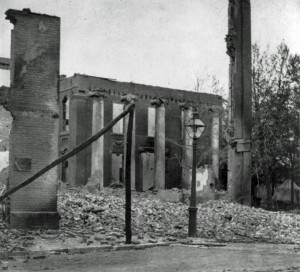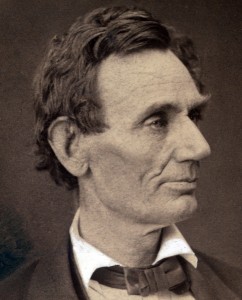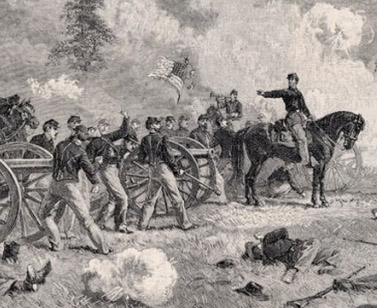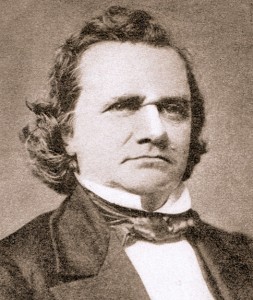 In late October 1860 the (Montpelier) Vermont Patriot confidently predicted that Senator Stephen Douglas would win Illinois’ electoral votes. “Illinois has never yet voted against the Democratic party for President,” as the Vermont Patriot noted. Democratic papers like the Vermont Patriot argued that voters had to support Douglas in order to remain “high above the surges of fanaticism.” This election, as the Springfield (IL) State Register explained, would result in either “harmony between the States or discord and civil war.” Yet on election day in 1860 Illinois went for the Republican ticket, Abraham Lincoln and Hannibal Hamlin. The Vermont Patriot would later describe the 1860 contest as “a Presidential election without a parallel.” You can learn more about Stephen Douglas and the 1860 election in Robert Walter Johannsen’s Stephen A. Douglas (1973) and James L. Huston’s Stephen A. Douglas and the Dilemmas of Democratic Equality (2007).
In late October 1860 the (Montpelier) Vermont Patriot confidently predicted that Senator Stephen Douglas would win Illinois’ electoral votes. “Illinois has never yet voted against the Democratic party for President,” as the Vermont Patriot noted. Democratic papers like the Vermont Patriot argued that voters had to support Douglas in order to remain “high above the surges of fanaticism.” This election, as the Springfield (IL) State Register explained, would result in either “harmony between the States or discord and civil war.” Yet on election day in 1860 Illinois went for the Republican ticket, Abraham Lincoln and Hannibal Hamlin. The Vermont Patriot would later describe the 1860 contest as “a Presidential election without a parallel.” You can learn more about Stephen Douglas and the 1860 election in Robert Walter Johannsen’s Stephen A. Douglas (1973) and James L. Huston’s Stephen A. Douglas and the Dilemmas of Democratic Equality (2007).
15
Oct
10
Election of 1860 – “Illinois Sure for Douglas”
Posted by sailerd Published in Civil War (1861-1865), Historic Periodicals Themes: Contests & Elections8
Oct
10
Burning of Chambersburg, PA (July 1864)
Posted by sailerd Published in Civil War (1861-1865), Historic Periodicals, Images, Letters & Diaries, Maps Themes: Battles & SoldiersOn July 30, 1864 Confederate cavalry under General John McCausland’s command entered Chambersburg, Pennsylvania and demanded that residents pay $500,000 in greenbacks or $100,000 in gold. Confederates planned to use the money to compensate Virginia residents whose homes in the Shenandoah Valley were burned by Union General David Hunter’s troops. After Chambersburg residents refused to pay, General McCausland followed General Jubal Early’s orders and burned the town. (this map shows which sections of the town were burned). General McCausland’s forces left the following day with Union cavalry in pursuit. Philadelphia resident Sidney George Fisher heard about the attack on August 1st. Confederates, as Fisher noted, had “set fire to the place without giving the people time to carry anything away.” Fisher believed that the Confederate actions were the results of the “prolonged” conflict. “The barbarous act shows what a bitter spirit is animating the contest,” as Fisher explained. The Bangor (ME) Whig and Courier, a Republican paper, also expressed “[sympathy for] the suffers at Chambersburg.” Yet “if the atrocious outrage shall awake Pennsylvania to the performance of duties she has long and shamefully neglected in her own defense,” the editor argued that this incident “will in the end prove to be one of the greatest blessings which has been vouchsafed us since the war began.” You can learn more about this attack in Benjamin Schneck’s The Burning of Chambersburg (1864) and Everard H. Smith’s “Chambersburg: Anatomy of a Confederate Reprisal,” American Historical Review (1991).
28
Sep
10
Election of 1860 – “Mr. Lincoln A Black Man”
Posted by sailerd Published in Antebellum (1840-1861), Historic PeriodicalsWhen European newspapers discussed Abraham Lincoln’s victory in the Election of 1860, their reporters did not always provide the correct details. In January 1861 the (Montpelier) Vermont Patriot highlighted a mistake in an editorial from the Drogheda (Ireland) Argus, which discussed the implications of “a black Man’s” victory for the United States. “No Presidential election has excited so much party feelings as has the election of Abraham Lincoln, a black gentleman,” as the Argus noted. The paper also claimed that Lincoln had been “unknown out of [Illinois]” before the 1860 election. While he might have been “unknown as a public man in Europe,” Lincoln had emerged as a national political figure during the Lincoln Douglas debates in 1858. After returning home to New York in July 1858, Charles H. Ray described how those outside Illinois were interested in Lincoln and the campaign:
“In my journey here from Chicago, and even here [in Norwich, New York]– one of the most out-of-the-way, rural districts in the State, among a slow-going and conservative people, who are further from railroads than any man can be in Illinois — I have found hundreds of anxious enquirers burning to know all about the newly raised-up opponent of Douglas… In fact, you have sprung at once from the position of a “capital fellow” and a “leading lawyer” in Illinois, to the enjoyment of a national reputation. Your speeches are read with great avidity by all political men…”
You can read more about Lincoln and his political career in Edwin Erie Sparks’ The Lincoln-Douglas Debates of 1858 (1908), David Donald’s Lincoln (1995), and Allen C. Guelzo’s Lincoln and Douglas: The Debates That Defined America (2008).
30
Aug
10
The Complicated Partisan Realities of 1860
Posted by Matthew Pinsker Published in Antebellum (1840-1861), Historic Periodicals Themes: Contests & Elections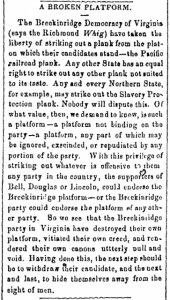 One hundred and fifty years ago today, the Charles Town, Virgina (there wasn’t a West Virginia yet)Free Press commented on reports that the state’s Breckinridge Democrats had abandoned a plank from their “national” party platform by repudiating support for the Pacific Railroad. This one little piece of fewer than 200 words illustrates how complicated the 1860 election was and how challenging it is for students to read nineteenth-century newspapers. The Free Press was a loyal southern rights Democratic paper run by the Gallaher family. They supported John Breckinridge, the nominee of the Southern Democrats and his new party’s attempts to cultivate western support through actions such as endorsing the Pacific (or transcontinental) Railroad and by anointing Senator Joseph Lane from Oregon as the party’s vice-presidential nominee. Yet the article, entitled “A Broken Platform,” reads like harsh criticism of the decision. “So we see,” reads the piece, “that the Breckinridge party in Virginia have destroyed their own platform, vitiated their own creed, and rendered their own canons null and void.” However, a careful reader will note that the piece begins with a parenthetical aside “(says the Richmond Whig)” referring to a leading paper in the state capital that supported John Bell and the Constitutional Union Party. Supporters of Breckinridge and Bell vied fiercely across southern states during the 1860 contest and by quoting from the Richmond Whig the Virginia Free Press was being sarcastic. Nineteenth-century readers understood the nuances (or so we imagine) but the finer differences and unique customs of partisan journalism are very difficult to explain to modern-day students.
One hundred and fifty years ago today, the Charles Town, Virgina (there wasn’t a West Virginia yet)Free Press commented on reports that the state’s Breckinridge Democrats had abandoned a plank from their “national” party platform by repudiating support for the Pacific Railroad. This one little piece of fewer than 200 words illustrates how complicated the 1860 election was and how challenging it is for students to read nineteenth-century newspapers. The Free Press was a loyal southern rights Democratic paper run by the Gallaher family. They supported John Breckinridge, the nominee of the Southern Democrats and his new party’s attempts to cultivate western support through actions such as endorsing the Pacific (or transcontinental) Railroad and by anointing Senator Joseph Lane from Oregon as the party’s vice-presidential nominee. Yet the article, entitled “A Broken Platform,” reads like harsh criticism of the decision. “So we see,” reads the piece, “that the Breckinridge party in Virginia have destroyed their own platform, vitiated their own creed, and rendered their own canons null and void.” However, a careful reader will note that the piece begins with a parenthetical aside “(says the Richmond Whig)” referring to a leading paper in the state capital that supported John Bell and the Constitutional Union Party. Supporters of Breckinridge and Bell vied fiercely across southern states during the 1860 contest and by quoting from the Richmond Whig the Virginia Free Press was being sarcastic. Nineteenth-century readers understood the nuances (or so we imagine) but the finer differences and unique customs of partisan journalism are very difficult to explain to modern-day students.
16
Aug
10
Election of 1860 – Hinton Rowan Helper
Posted by sailerd Published in Antebellum (1840-1861), Historic Periodicals, Rare Books Themes: Contests & Elections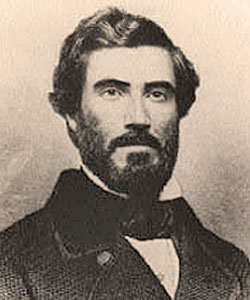 Even though Hinton Rowan Helper published The Impending Crisis of the South: How to Meet It in 1857, the book was still a factor in the election of 1860. While Helper was born in North Carolina to a family that owned more than 200 slaves, he used the Impending Crisis to call for the South to end slavery. That institution, as Helper argued, limited the economic potential of white labor and prevented the South’s economy from developing. In 1859 Helper published the Compendium of the Impending Crisis of the South – a cheaper edition of that reached thousands of readers. By the election of 1860 northern Democratic editors like James Gordon Bennett, who owned the New York Herald, used Helper’s book as evidence that the Republican party was dangerous to the United States. On election day in November 1860 the Herald warned voters that Republicans had “circulated hundreds of thousands of Helper’s handbook of treason.” Prominent Republicans had endorsed the book, which as the Herald explained, were “[distributed] to abolitionize the Northern mind.” If Abraham Lincoln became President, the Herald argued that “one phase of [his] administration [would be] to engender or to inaugurate, if possible, a civil war at the South between the non-slaveholding whites of that section (excited by abolition emissaries) and those who own slaves.” One of the best secondary sources on Helper is David Brown’s Southern Outcast: Hinton Rowan Helper and The Impending Crisis of the South (2006).
Even though Hinton Rowan Helper published The Impending Crisis of the South: How to Meet It in 1857, the book was still a factor in the election of 1860. While Helper was born in North Carolina to a family that owned more than 200 slaves, he used the Impending Crisis to call for the South to end slavery. That institution, as Helper argued, limited the economic potential of white labor and prevented the South’s economy from developing. In 1859 Helper published the Compendium of the Impending Crisis of the South – a cheaper edition of that reached thousands of readers. By the election of 1860 northern Democratic editors like James Gordon Bennett, who owned the New York Herald, used Helper’s book as evidence that the Republican party was dangerous to the United States. On election day in November 1860 the Herald warned voters that Republicans had “circulated hundreds of thousands of Helper’s handbook of treason.” Prominent Republicans had endorsed the book, which as the Herald explained, were “[distributed] to abolitionize the Northern mind.” If Abraham Lincoln became President, the Herald argued that “one phase of [his] administration [would be] to engender or to inaugurate, if possible, a civil war at the South between the non-slaveholding whites of that section (excited by abolition emissaries) and those who own slaves.” One of the best secondary sources on Helper is David Brown’s Southern Outcast: Hinton Rowan Helper and The Impending Crisis of the South (2006).
30
Jul
10
Confederate raid on Chambersburg, Pennsylvania (October 1862)
Posted by sailerd Published in Civil War (1861-1865), Historic Periodicals, Images, Letters & Diaries Themes: Battles & Soldiers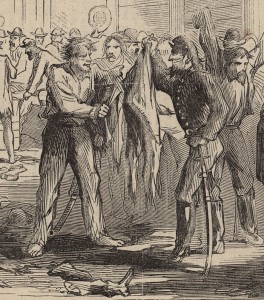 Before going to bed on October 10, 1862, Chambersburg resident William Heyser noted in his diary that he had “secreted some of my most valuable papers.” Confederate cavalry under the command of General J. E. B. Stuart had arrived several hours earlier and forced the town to surrender. Union forces had been caught by surprise and none were available to defend the town. “It would have been an act of madness to have made resistance…and would have involved the total destruction of the town,” as the Chambersburg (PA) Valley Spirit noted. The raid, as the Milwaukee (WI) Sentienel described, “was the most daring adventure of the war” so far. Besides gathering intelligence, one of the Confederate’s other objectives was to take as many supplies as possible. Horses were one key item and Alexander Kelly McClure, an assistant adjutant Union general, later recalled how ten horses were taken from his farm. (You can read McClure’s full account of the Confederate raid – “A Night With Stuart’s Raiders”- here). Yet as one Confederate soldier’s letter revealed, they also seized a number of other supplies. “I got 8 pair of boots, 4 over coats, 5 pair of pantaloons, 2 hats, 6 pair of socks, 6 pr. Draws, 6 over & under shirts, [and] some coffe & sugar” during the raid, as Edward Cottrell told his grandmother. As Confederates left Chambersburg on October 11, they burned warehouses that held government supplies. One contained ammunition and, as Heyser described, “the succeeding explosions of shells and power was tremendous.” While Union forces were dispatched to intercept and capture the raiders, General Stuart evaded them and returned to Virginia without any major engagements. You can read more about the raid in Emory M. Thomas’ Bold Dragoon: The Life of J.E.B. Stuart (1986) and Jeffry D. Wert’s Cavalryman of the Lost Cause: A Biography of J. E. B. Stuart (2008).
Before going to bed on October 10, 1862, Chambersburg resident William Heyser noted in his diary that he had “secreted some of my most valuable papers.” Confederate cavalry under the command of General J. E. B. Stuart had arrived several hours earlier and forced the town to surrender. Union forces had been caught by surprise and none were available to defend the town. “It would have been an act of madness to have made resistance…and would have involved the total destruction of the town,” as the Chambersburg (PA) Valley Spirit noted. The raid, as the Milwaukee (WI) Sentienel described, “was the most daring adventure of the war” so far. Besides gathering intelligence, one of the Confederate’s other objectives was to take as many supplies as possible. Horses were one key item and Alexander Kelly McClure, an assistant adjutant Union general, later recalled how ten horses were taken from his farm. (You can read McClure’s full account of the Confederate raid – “A Night With Stuart’s Raiders”- here). Yet as one Confederate soldier’s letter revealed, they also seized a number of other supplies. “I got 8 pair of boots, 4 over coats, 5 pair of pantaloons, 2 hats, 6 pair of socks, 6 pr. Draws, 6 over & under shirts, [and] some coffe & sugar” during the raid, as Edward Cottrell told his grandmother. As Confederates left Chambersburg on October 11, they burned warehouses that held government supplies. One contained ammunition and, as Heyser described, “the succeeding explosions of shells and power was tremendous.” While Union forces were dispatched to intercept and capture the raiders, General Stuart evaded them and returned to Virginia without any major engagements. You can read more about the raid in Emory M. Thomas’ Bold Dragoon: The Life of J.E.B. Stuart (1986) and Jeffry D. Wert’s Cavalryman of the Lost Cause: A Biography of J. E. B. Stuart (2008).
28
Jul
10
Election of 1860 – Southerners Unionists
Posted by sailerd Published in Antebellum (1840-1861), Historic Periodicals Themes: Contests & Elections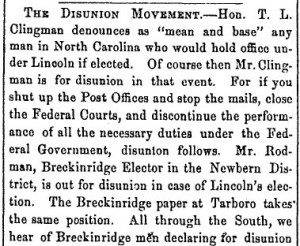 While some southern editors argued before election day in November 1860 that a Republican victory would justify secession, the Fayetteville (NC) Observer was prepared to accept Abraham Lincoln as President. The Observer, which supported Constitutional Union candidates John Bell and Edward Everett, believed that there was no choice but to accept the results of an election that they participated in. If “[it was] decided constitutionally,” the Observer explainedthat “we [were] honor bound to abide its results.” Southerners who threatened to secede only created more problems, particularly those who were not prepared to follow through with their threats. “We have had enough of ultimatum-manufacturing,” as the Observer noted. Those southerners had a bad “habit of invariably back out after” issuing ultimatums and, as the Observer argued, the repeated false alarms “[had] made the North believe that the South cannot be kicked out of the Union.” This scenario was dangerous since the Observer, like other unionist papers, did not completely reject secession as an option. If President Lincoln took any action that they considered a threat to slavery, many would support disunion. For the Observer and other ‘conditional’ unionists, the turning point was President Lincoln’s call for volunteers after Confederates attacked Fort Sumter in April 1861. One of the best sources on southern unionists’ perspectives during this period is Daniel W. Crofts’ Reluctant Confederates: Upper South Unionists in the Secession Crisis (1989). While Crofts discusses the Upper South, Edward Ayers focuses on southern unionists Augusta County, Virginia in In the Presence of Mine Enemies: War in the Heart of America, 1859-1863 (2003). You can learn more about that community online at the Valley of the Shadow project.
While some southern editors argued before election day in November 1860 that a Republican victory would justify secession, the Fayetteville (NC) Observer was prepared to accept Abraham Lincoln as President. The Observer, which supported Constitutional Union candidates John Bell and Edward Everett, believed that there was no choice but to accept the results of an election that they participated in. If “[it was] decided constitutionally,” the Observer explainedthat “we [were] honor bound to abide its results.” Southerners who threatened to secede only created more problems, particularly those who were not prepared to follow through with their threats. “We have had enough of ultimatum-manufacturing,” as the Observer noted. Those southerners had a bad “habit of invariably back out after” issuing ultimatums and, as the Observer argued, the repeated false alarms “[had] made the North believe that the South cannot be kicked out of the Union.” This scenario was dangerous since the Observer, like other unionist papers, did not completely reject secession as an option. If President Lincoln took any action that they considered a threat to slavery, many would support disunion. For the Observer and other ‘conditional’ unionists, the turning point was President Lincoln’s call for volunteers after Confederates attacked Fort Sumter in April 1861. One of the best sources on southern unionists’ perspectives during this period is Daniel W. Crofts’ Reluctant Confederates: Upper South Unionists in the Secession Crisis (1989). While Crofts discusses the Upper South, Edward Ayers focuses on southern unionists Augusta County, Virginia in In the Presence of Mine Enemies: War in the Heart of America, 1859-1863 (2003). You can learn more about that community online at the Valley of the Shadow project.
28
Jul
10
Partisan Fear-mongering in 1860
Posted by Published in Antebellum (1840-1861), Historic Periodicals, Images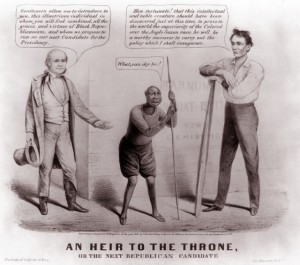 After what could only be mildly described as a tumultuous decade of failed compromises, the rise of a new political party, and a disgruntled citizenry, the 1860 Election season met with the pronounced fears over the future course of the United States. Partisan newspapers relished the opportunity to hack away at their opponents by castigating their political views and theorizing on pressing social fears within the South. The Chicago Press and Tribune noted that the “slave breeders” of the South feared a Republican party in their midst that could claim Founders as part of its political pedigree. The article also cites an undated piece from the New Orleans Courier which speculated that if Republicans proved victorious in the upcoming election, Southerners would have to openly embrace the patronage positions offered them as members of a new Southern Republican “nucleus.” (Ironically, Lincoln and his cabinet maintained their hope in a latent Southern Unionism in Virginia that would dissuade the Upper South from seceding.) Other fears for the upcoming election literally struck at the belly of the South. Again, the Chicago Press and Tribune stated that a “poor corn-crop” would precede a potential famine in the upcoming year. Instead of stoking this fear in their hearts, Southerners could remain “patriots and good citizens’ by “behaving themselves” in the wake of Abraham Lincoln’s election. However, the Press and Tribune cynically mused that the “dissolution” of the Union would only be averted until the South had a “full crop.” Articles in partisan papers such as the Chicago Press and Tribune reveal the broad spectrum of fears endemic to the United States in the months leading up to the Election of 1860.
After what could only be mildly described as a tumultuous decade of failed compromises, the rise of a new political party, and a disgruntled citizenry, the 1860 Election season met with the pronounced fears over the future course of the United States. Partisan newspapers relished the opportunity to hack away at their opponents by castigating their political views and theorizing on pressing social fears within the South. The Chicago Press and Tribune noted that the “slave breeders” of the South feared a Republican party in their midst that could claim Founders as part of its political pedigree. The article also cites an undated piece from the New Orleans Courier which speculated that if Republicans proved victorious in the upcoming election, Southerners would have to openly embrace the patronage positions offered them as members of a new Southern Republican “nucleus.” (Ironically, Lincoln and his cabinet maintained their hope in a latent Southern Unionism in Virginia that would dissuade the Upper South from seceding.) Other fears for the upcoming election literally struck at the belly of the South. Again, the Chicago Press and Tribune stated that a “poor corn-crop” would precede a potential famine in the upcoming year. Instead of stoking this fear in their hearts, Southerners could remain “patriots and good citizens’ by “behaving themselves” in the wake of Abraham Lincoln’s election. However, the Press and Tribune cynically mused that the “dissolution” of the Union would only be averted until the South had a “full crop.” Articles in partisan papers such as the Chicago Press and Tribune reveal the broad spectrum of fears endemic to the United States in the months leading up to the Election of 1860.
26
Jul
10
Election of 1860 – John Breckinridge
Posted by sailerd Published in Antebellum (1840-1861), Historic Periodicals Themes: Contests & Elections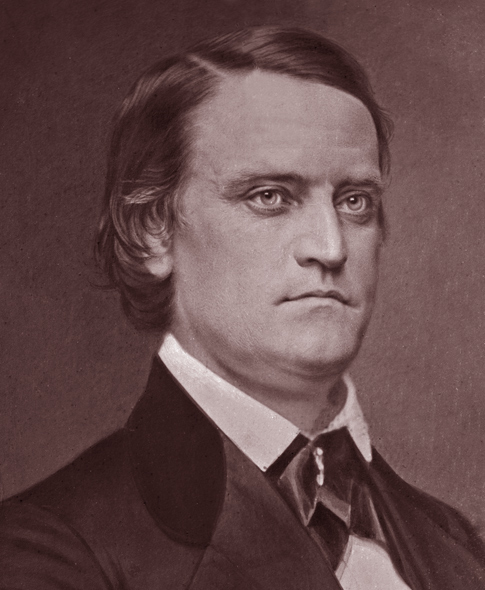 After southern Democratic delegates in Baltimore, Maryland refused to accept Senator Stephen Douglas as a candidate for the election of 1860, they nominated Vice President John C. Breckinridge on June 23, 1860. Soon after Breckinridge’s campaign biography was published, which one can read online at archive.org. Some editors saw Breckinridge’s campaign and, in particular his supporters, as a serious threat to the Union. The Lowell (MA) Citizen & News, which supported the Republican party, warned that the group’s ultimate goal was secession. “There [were] many prominent southern supporters of Breckinridge and Lane who go for that ticket …[because it] will be most likely to achieve…a dissolution of the Union,” the Citizen & News argued. Southern newspapers like the Charlestown (VA) Free Press, which supported the Constitutional Union party, reached a similar conclusion. “No sane man can doubt that a dissolution of the Union is the ultimate object of the Seceders who put up Breckinridge and Lane as their leaders,” as the Free Press concluded. Editors who backed other candidates wanted Breckinridge to explain what actions he would recommend in the event of a Republican victory in November 1860. After a speech in Lexington, Kentucky, the Richmond (VA) Whig noted that “[Breckinridge] did not say, nor did he dare say, what course he would advise the Seceding and Disunion party…to take in case a Black Republican President” win the election. The (Jackson) Mississippian, however, used the same speech to reach the opposite conclusion. “It [was] a great speech, perfectly overwhelming in its refutation of the charges…of ‘disunion,’” as the Mississippian explained. (The full text of Breckinridge’s speech is available in an articled published on the New York Times’ website). Breckinridge, as the Mississippian argued, “had always been the able and faithful champion of ‘the Union, the Constitution, and the equality of the States.’” Breckinridge attempted to bridge the sectional divide after Lincoln’s victory in November 1860, but twelve months after the election he joined the Confederate army as a brigadier general.
After southern Democratic delegates in Baltimore, Maryland refused to accept Senator Stephen Douglas as a candidate for the election of 1860, they nominated Vice President John C. Breckinridge on June 23, 1860. Soon after Breckinridge’s campaign biography was published, which one can read online at archive.org. Some editors saw Breckinridge’s campaign and, in particular his supporters, as a serious threat to the Union. The Lowell (MA) Citizen & News, which supported the Republican party, warned that the group’s ultimate goal was secession. “There [were] many prominent southern supporters of Breckinridge and Lane who go for that ticket …[because it] will be most likely to achieve…a dissolution of the Union,” the Citizen & News argued. Southern newspapers like the Charlestown (VA) Free Press, which supported the Constitutional Union party, reached a similar conclusion. “No sane man can doubt that a dissolution of the Union is the ultimate object of the Seceders who put up Breckinridge and Lane as their leaders,” as the Free Press concluded. Editors who backed other candidates wanted Breckinridge to explain what actions he would recommend in the event of a Republican victory in November 1860. After a speech in Lexington, Kentucky, the Richmond (VA) Whig noted that “[Breckinridge] did not say, nor did he dare say, what course he would advise the Seceding and Disunion party…to take in case a Black Republican President” win the election. The (Jackson) Mississippian, however, used the same speech to reach the opposite conclusion. “It [was] a great speech, perfectly overwhelming in its refutation of the charges…of ‘disunion,’” as the Mississippian explained. (The full text of Breckinridge’s speech is available in an articled published on the New York Times’ website). Breckinridge, as the Mississippian argued, “had always been the able and faithful champion of ‘the Union, the Constitution, and the equality of the States.’” Breckinridge attempted to bridge the sectional divide after Lincoln’s victory in November 1860, but twelve months after the election he joined the Confederate army as a brigadier general.
26
Jul
10
An Angry Father At Gettysburg
Posted by Matthew Pinsker Published in Civil War (1861-1865), Historic Periodicals, Images Themes: Battles & Soldiers Sam Wilkeson was a war correspondent for the New York Times who had sons in the Union army, including Lt. Bayard Wilkeson, an artillery officer who was mortally wounded on the first day at Gettysburg. The story of Bayard’s death became a northern sensation since he was one of the youngest artillery officers in the army, the son of a prominent journalist and also because he died in a particularly heroic fashion. The young lieutenant covered the retreating forces from the Union XI Corps on the battle’s first day and reportedly had to amputate his own shattered leg when doctors were forced to flee in the face of the oncoming Confederates. The elder Wilkeson, who was married to Elizabeth Cady Stanton’s sister, recovered his mangled son’s body in Gettysburg’s aftermath and wrote an angry report in the Times which appeared on July 6. The article began: “Who can write the history of a battle whose eyes are immovably fastened upon a central figure of transcendingly absorbing interest –the dead body of an oldest born son, crushed by a shell in a position where a battery should never have been sent, and abandoned to death in a building where surgeons dared not to stay.” Unionists later redistributed the moving piece as a pamphlet under the title: Samuel Wilkeson’s Thrilling Word Picture Of Gettysburgh. Artist Alfred Waud also drew a famous sketch of the young Wilkeson directing his battery on the battlefield. The story remains one of the most compelling of the battle. You can read more about it here at a special blog site built by Civil War enthusiast Randy Chadwick. Also, Louis M. Starr’s Bohemian Brigade: Civil War Newsmen in Action (1954) provides good context and more detail about Sam Wilkeson, one of the nation’s first embedded war correspondents. A more recent study by Michael A. Dreese, Torn Families: Death and Kinship at the Battle of Gettysburg (2007), provides several descriptive pages (available through Google Books) as part of a fascinating chapter on fathers and sons during the war.
Sam Wilkeson was a war correspondent for the New York Times who had sons in the Union army, including Lt. Bayard Wilkeson, an artillery officer who was mortally wounded on the first day at Gettysburg. The story of Bayard’s death became a northern sensation since he was one of the youngest artillery officers in the army, the son of a prominent journalist and also because he died in a particularly heroic fashion. The young lieutenant covered the retreating forces from the Union XI Corps on the battle’s first day and reportedly had to amputate his own shattered leg when doctors were forced to flee in the face of the oncoming Confederates. The elder Wilkeson, who was married to Elizabeth Cady Stanton’s sister, recovered his mangled son’s body in Gettysburg’s aftermath and wrote an angry report in the Times which appeared on July 6. The article began: “Who can write the history of a battle whose eyes are immovably fastened upon a central figure of transcendingly absorbing interest –the dead body of an oldest born son, crushed by a shell in a position where a battery should never have been sent, and abandoned to death in a building where surgeons dared not to stay.” Unionists later redistributed the moving piece as a pamphlet under the title: Samuel Wilkeson’s Thrilling Word Picture Of Gettysburgh. Artist Alfred Waud also drew a famous sketch of the young Wilkeson directing his battery on the battlefield. The story remains one of the most compelling of the battle. You can read more about it here at a special blog site built by Civil War enthusiast Randy Chadwick. Also, Louis M. Starr’s Bohemian Brigade: Civil War Newsmen in Action (1954) provides good context and more detail about Sam Wilkeson, one of the nation’s first embedded war correspondents. A more recent study by Michael A. Dreese, Torn Families: Death and Kinship at the Battle of Gettysburg (2007), provides several descriptive pages (available through Google Books) as part of a fascinating chapter on fathers and sons during the war.
To view a slideshow in Flickr, click on any of the images below:
